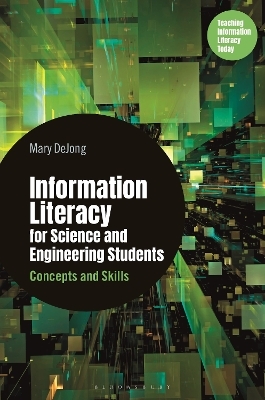
Information Literacy for Science and Engineering Students
Bloomsbury Libraries Unlimited (Verlag)
978-1-4408-7876-3 (ISBN)
Beginning with a strong foundation in the utility, structure, and packaging of information, this useful handbook helps students and working professionals decode real-world information literacy problems. Mary DeJong provides a compelling context and rationale for the skills scientists and engineers need to succeed in challenging careers that rely on the successful discovering and sharing of complex information. Students will appreciate the in-depth information on sources, especially those needed for research assignments, and scientists and engineers who write for publication will benefit from chapters on searching databases and organizing and citing sources. Written with science and engineering students and professionals in mind, this book is thorough, well-paced, engaging, and even funny.
Mary DeJong is a librarian at Cline Library, Northern Arizona University, USA.
Part 1: Overview
1 Information Literacy: What It Is and Why It Matters
Part 2: Sources: Their Functions, Distinctions, and Where To Find Them
2 Information Is Documented in Sources
3 Books
4 Newspapers and Other News Sources
5 Magazines
6 Journals and Journal Articles
7 Research Articles
8 Review Articles
9 Conference Proceedings and Conference Papers
10 Dissertations and Theses
11 Websites
12 Data
13 Patents, Standards, and Codes
Part III: Important Qualities of Sources
14 Scholarly Sources
15 Popular Sources
16 Primary and Secondary Sources
17 Credible Sources
Part IV: Understanding the Sources You Need for Research Assignments
18 Decoding Your Research Assignment Instructions
19 Choosing a Topic that Matches Source Requirements
PART V: All About Databases
20 Types of Databases
21 Database Records
22 Database Search Features
23 Choosing the Best Databases
Part VI: Searching Databases for Sources
24 Identifying Keywords to Search
25 Conducting Comprehensive Searches
26 Search Techniques
Part VII: Organizing Your Sources
27 Managing Source Records
28 Accessing Full-Text Sources
Part VIII: Citing Your Sources
29 The Importance of Citing Sources
30 Incorporating Sources into Your Writing
31 Formatting Citations
Appendix A. Get Help with Your Research
Appendix B. Scholarly Metrics
Appendix C. Open Access and the Open Science Movement
Appendix D. Social Networking for Scientists and Engineers
Index
| Erscheinungsdatum | 07.09.2024 |
|---|---|
| Reihe/Serie | Libraries Unlimited Series for Teaching Information Literacy Today |
| Zusatzinfo | 138 b&w |
| Sprache | englisch |
| Maße | 156 x 235 mm |
| Themenwelt | Schulbuch / Wörterbuch ► Lexikon / Chroniken |
| Mathematik / Informatik ► Informatik ► Theorie / Studium | |
| Sozialwissenschaften ► Kommunikation / Medien ► Buchhandel / Bibliothekswesen | |
| Sozialwissenschaften ► Pädagogik | |
| Technik | |
| ISBN-10 | 1-4408-7876-5 / 1440878765 |
| ISBN-13 | 978-1-4408-7876-3 / 9781440878763 |
| Zustand | Neuware |
| Haben Sie eine Frage zum Produkt? |
aus dem Bereich


